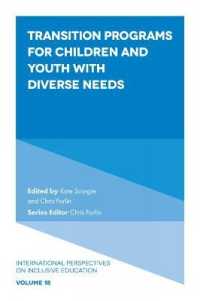- ホーム
- > 洋書
- > 英文書
- > Computer / General
Full Description
Despite still being in its infancy, artificial intelligence (AI) has already shown enormous potential to advance humanity towards new frontiers of prosperity and growth. Due to its powerful force, however, AI can also pose significant risks, which should be handled with the utmost care, but not with fear. The world's top political leaders have understood AI's disruptive potential and are rushing to secure a competitive advantage in this crucial emerging domain, even at the price of reviving old-fashioned industrial policy. At the same time, academia and civil society are calling for widely shared ethical principles to avoid negative repercussions. In this fast-changing context, Europe is struggling to keep pace with superpowers like the United States and China.This report summarises the work of the CEPS Task Force on Artificial Intelligence, which met throughout 2018. Arguing that the EU and its member states are uniquely positioned to lead the global community towards responsible, sustainable AI development, its members call upon European leaders to focus on leveraging AI's potential to foster sustainable development in line with the 2030 Agenda. The report puts forward 44 recommendations on how to design and promote lawful, responsible and sustainable AI and how to approach future policy and investment decisions with the aim of positioning Europe in the driver's seat to address the most disruptive technology transition of our times.
Contents
IntroductionPart I. Artificial Intelligence: Definition, limits and opportunities 41. A basic definition of AI and related AI systems 71.1 What AI can do: Main techniques and use cases 141.2 Winter is not coming (at least for AI) 171.3 Handle with care, not with fear 211.4 Main findings 262. A way forward for developing AI: Complementarity, responsibility and sustainability 272.1 Complementarity 272.2 Responsibility and trust: Bias and value alignment 302.3 Sustainability 342.4 Conclusion: An enormous potential, in need of direction 35Part II. Europe in the Global Race for AI 363. Global AI competition: Why global standards will not emerge without concerted action 373.1 Where is AI going? Between global good and the temptation of sovereignty 404. The EU's emerging strategy for AI 434.1 Towards ethical guidelines: The EU's "secret sauce" for AI 454.2 "What" should be included in the EU Ethics Guidelines 484.3 An analysis of the current Draft Ethics Guidelines 614.4 "How" to promote the Ethics Guidelines? 685. Policy changes: Revolution or evolution? 745.1 The Better Regulation agenda and AI 745.2 Reforming liability rules? 825.3 Boosting data-driven innovation through ad-hoc policies? 925.4 Research, innovation, education and society: Towards a new strategy? 965.5 The Commission's Coordinated Plan - a brief analysis 1075.6 Can Europe be the champion of "AI for Good"? 109Part III. The Way Forward 1126. Main recommendations 1136.1 Recommendations on the Draft Ethics Guidelines 1136.2 Recommendations on future EU policy and investment priorities 120References 126Annex. CEPS Task Force Members and Guest Speakers 143








